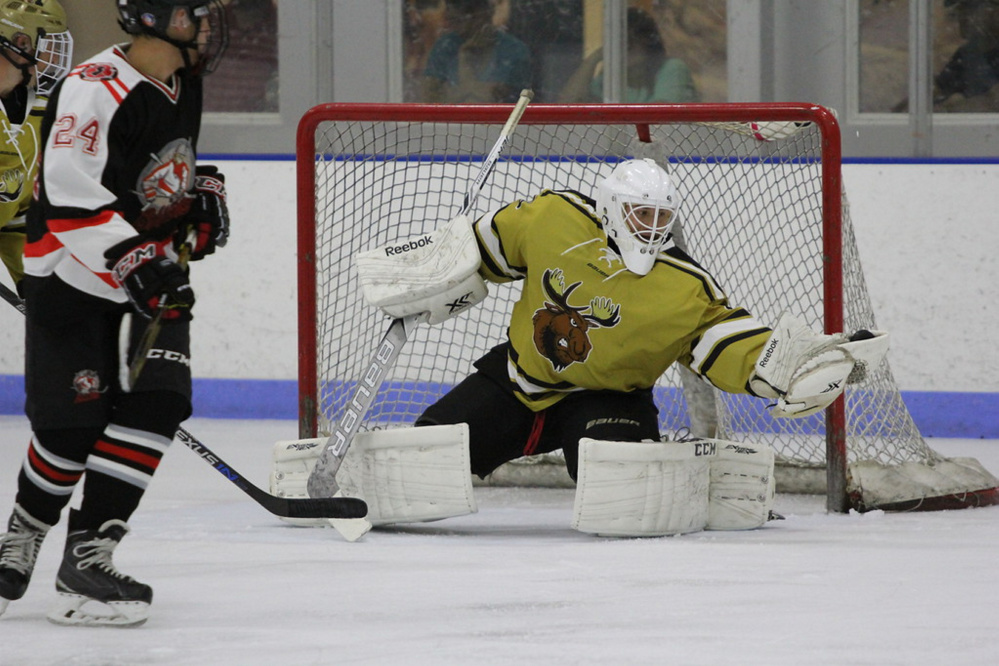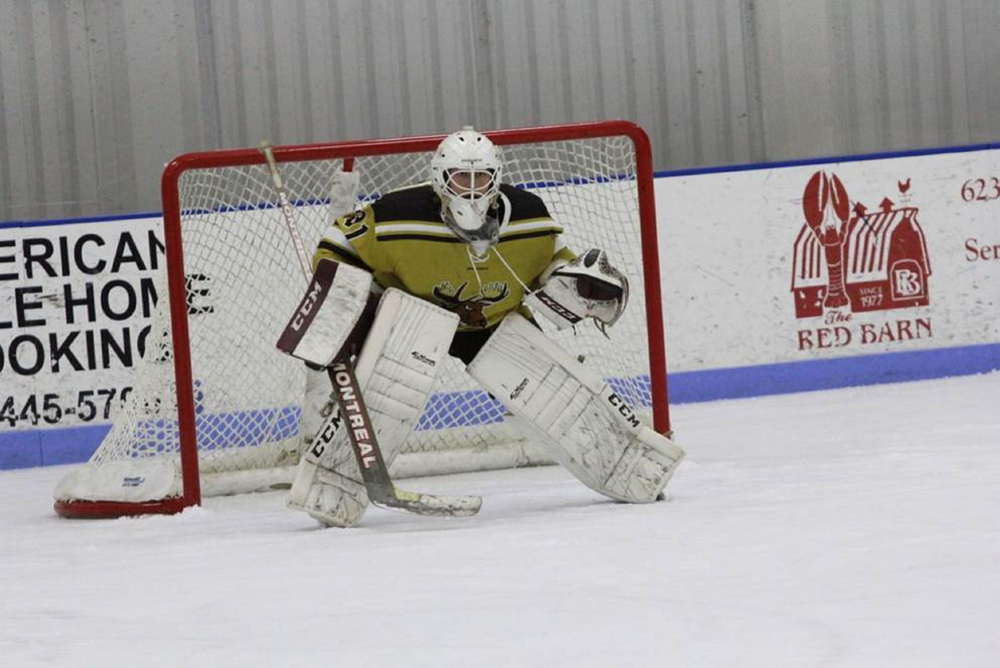Esa Maki skates off the ice during practice for a game he’s starting, and Derek Fournier is waiting with advice. Fournier sits in the locker room during an intermission, and Maki is ready with a joke.
So it goes at the goaltender position for the Maine Moose 18U hockey team, where Fournier and Maki balance a drive for playing time and exposure with one of the team’s strongest friendships.
“They’re battling, they want to be the guy. But at the end of the day, it’s not against each other,” coach Jeff Ross said. “They both have the talent, they both have the skill. It’s just an issue of ‘I need to do my job so the next guy can do his.’ “
The two have combined to backstop the Moose through a 34-1 season, one that included victory in the MEAHA state tournament in November for a berth in the Youth Tier II national championships in Lansing, Michigan in April. For most of the players on the team it’s a chance for a repeat, as the core of the 18U team won the 16U national championship in New Jersey last year, and will appear in its fourth straight national tournament this year.
“It’s been huge for the program,” said Moose general manager and owner Ben Gray, who also presides over the 16U Moose team that will be competing at nationals in Dallas. “People see this as a good avenue for those that are looking to move on to prep schools, juniors, those that are looking to move on to, eventually, college. They’re getting their recognition here.”
There are few positions they’re better stocked at than in net. Maki, a senior at Kents Hill School, is the goalie that guided the Moose to the championship last year and who’s on the radar of the Topeka RoadRunners of the North American Hockey League, USA Hockey’s second-highest junior hockey organization. Fournier, a new addition out of Bangor, was drafted by the Saint John Sea Dogs of the Quebec Major Junior Hockey League, one of the three making up the prestigious Canadian Hockey League, the top producer of players for the NHL.
“I think they’re arguably the two best goalies in the state,” Ross said. “I don’t think there’s much doubt about that.”
Their ties extend beyond their development into bona fide hockey prospects. Maki and Fournier have known each other since childhood, and though they were always on different teams — Maki landing with the Moose, Fournier playing for the Maine Freeze — youth hockey is an interlinked world, and they frequently crossed paths at youth games, events and tournaments.
“He and I have been friends ever since I remember playing goalie, really,” Fournier said. “Going down to Augusta to play in tournaments and everything, I always look for Esa and I always find him and we’ll hang out.”
“I’ve known him forever,” Maki said. “We’ve never really played together, so this year’s been pretty good. It’s been quite an experience.”
They finally became teammates when Gray persuaded Fournier to join up. Fournier wanted to boost his name in hockey circles, and Gray was eager to add to the championship formula.
“We try to make those little tweaks and changes that continue to make us the toughest team out there,” Gray said. “When you have that kind of 1-2 punch in your goal, that can really do damage to other teams, knowing that that’s what they have to go up against.”
Ross found ways to let both of his goalies shine. Maki and Fournier split games, which in turn prevented any fatigue from building up. If the team had games on Saturday and Sunday, Maki would get one, Fournier would get the other. If the team played twice in one night, one got the early game, one got the nightcap.
That meant sharing the role, and with it, chances to further bolster their name for interested programs and coaches. And the goalies loved it.
“I thought that was great,” Maki said. “Two games in one day is kind of hard to handle, playing the whole game.”
The two maintained a supportive relationship throughout. Friendship is one thing, but each knew how important it was for the other to play well to keep the team’s goals alive.
“When he gets, and it’s the same with me, a little agitated or he thinks he’s doing something wrong, we start to go downhill from there,” Fournier said. “I’ll just try to keep it light, I’ll just try to keep him laughing in the locker room in between periods. That really does seem to help him stay focused on the game more than his game.”
The dynamic was challenged when Maki was summoned by the RoadRunners as an emergency substitute at the start of the playoffs. That left Fournier as the lone starter, and though Maki returned before the tournament’s end, Ross stayed with the hot hand and Fournier, who guided the Moose to a 5-0 record and the title while surrendering only four goals.
The decision wasn’t easy for Maki, who was eager to play and help lead the team with which he had won a national championship just a year earlier.
“I was disappointed, because obviously I wanted to play,” he said. “But at the same time, I was happy for him. He deserves to be able to play a lot. He’s very good.”
That was the impression Fournier and his coaches got. In the biggest tournament of the season, the friendship remained strong.
“I think he took it pretty well, to be honest,” Fournier said. “He didn’t show any emotion or anything. He knew it was best for the team at the time.”
The story isn’t over. There’s still the national tournament ahead, and Ross made himself clear. Fournier will play. And Maki will too.
“Absolutely,” he said. “If they continue to play the way they’ve been playing and they continue to be productive, we’ll just keep rotating them.”
Then there’s the future. Maki hopes to play for Topeka next year after spending just over a week there in November, with the goal of eventually playing in college. Fournier doesn’t intend to play in the QMJHL, since his primary goal is college hockey and joining Saint John would end his eligibility. Still, he knows draft stock in one of Canada’s top leagues isn’t a bad way to separate your name from the ranks.
“It was definitely an honor to be drafted into the league,” he said. “I think the most dominating use of it is as a perk on my hockey resume if I’m going to talk to other coaches.”
That can wait, though. There’s still a national tournament, come the spring, to think about. No matter who’s in net.
“They’re easy to have that conversation with,” Ross said. “It makes things so much easier when you’ve got two guys that get along that well.”
Drew Bonifant — 621-5638
dbonifant@centralmaine.com
Twitter: @dbonifantMTM
Send questions/comments to the editors.





Success. Please wait for the page to reload. If the page does not reload within 5 seconds, please refresh the page.
Enter your email and password to access comments.
Hi, to comment on stories you must . This profile is in addition to your subscription and website login.
Already have a commenting profile? .
Invalid username/password.
Please check your email to confirm and complete your registration.
Only subscribers are eligible to post comments. Please subscribe or login first for digital access. Here’s why.
Use the form below to reset your password. When you've submitted your account email, we will send an email with a reset code.